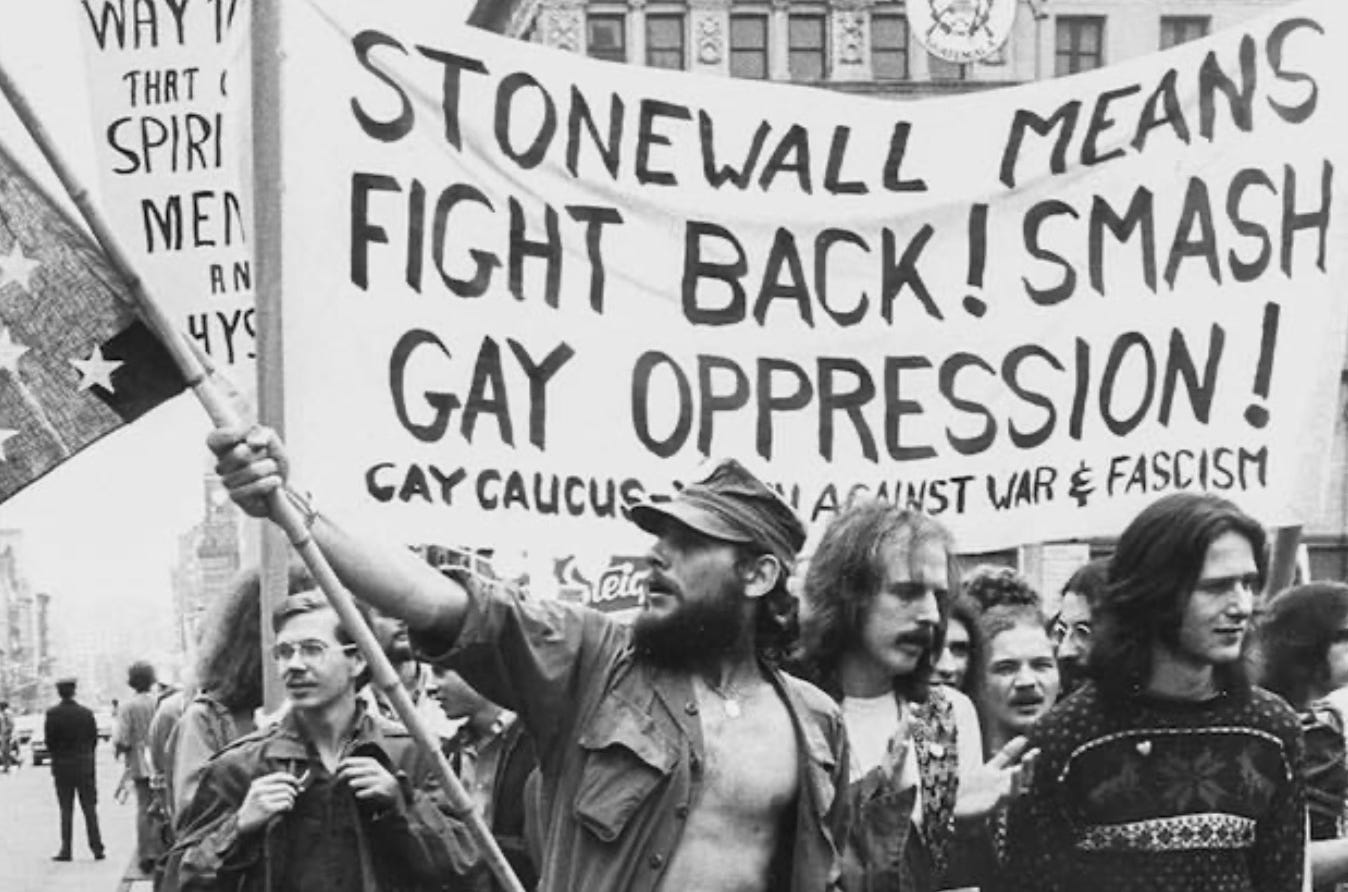
Before Pride was corporations adorned in glitter and rainbows, it was rebellion and hard-fought survival. It was queer bodies lining the streets and fighting back against brutality. The point of Pride was never to celebrate, but simply to live and exist as we are. Every June, brands mass-produce products and slap on rainbows with colors so bold they blind the public to the defiant beginnings that birthed Pride. The Stonewall Uprising of 1969 is a beginning that must be discussed widely and often—especially given the current political climate.
Located in Greenwich Village, the Stonewall Inn was a popular gay bar. But that popularity came at a cost. Patrons and staff were routinely targeted by police in raids rooted in bigotry and violence. On June 28, 1969, the community had reached its breaking point. The raid that night escalated into a full-scale uprising—fueled by anger, exhaustion, and a collective refusal to remain silent.

At the forefront was Stormé DeLarverie, a biracial, butch lesbian and drag king. She is often credited with throwing the first punch that ignited the rebellion. By physically resisting police brutality, she sparked a wave of defiance that would go on to change history. In reference to the Stonewall Uprising, commonly titled “The Stonewall Riots” she made the powerful statement,
“It was a rebellion, it was an uprising, it was a civil rights disobedience — it wasn’t no damn riot.”
At the heart of this resistance were two tireless activists: Marsha P. Johnson and Sylvia Rivera. Johnson, a Black trans woman and drag queen, and Rivera, a Latina trans woman and street activist, stood side by side on the front lines of Stonewall. To quote Rivera
“You don’t know what it was like to be thrown out on the streets because of your gender identity and who you love,”

In the wake of Stonewall, Johnson and Rivera co-founded STAR (Street Transvestite Action Revolutionaries), a housing collective for homeless queer youth.
Despite their trailblazing work, both women were often erased from mainstream depictions of LGBTQ+ history—due to their race, gender identity, and economic status.
Today, Pride has been largely sanitized. It has become a commercial spectacle, often referred to as “Rainbow Capitalism.” While corporations flood stores with rainbow merchandise in June, they often do little to materially support the queer community– especially the most vulnerable among us. Meanwhile, queer and trans people, particularly those of color, continue to be marginalized, silenced, and attacked.
To this day, the queer community continues to fight battles that echo the spirit of resistance shown during the Stonewall uprising.
Across the country — and around the world — LGBTQ+ people are under attack through bigoted legislation, book bans, and medical discrimination. In 2024 alone, hundreds of anti-LGBTQ+ bills have been introduced in the United States—many of which target trans youth. These bills seek to criminalize access to gender-affirming healthcare, restrict participation in sports, and punish young people simply for expressing themselves at school.
In response, grassroots movements, mutual aid networks, and youth-led organizations are rising up. Groups like the Transgender Law Center, Black and Pink, and GLAAD continue the work of visibility, advocacy, and protection that Marsha P. Johnson and Sylvia Rivera helped spark decades ago.
Pride must not lose its radical edge to rainbow capitalism or political apathy. To truly honor the legacy of Stonewall is to understand that the fight for queer liberation is far from over. The parades and festivals only hold meaning when they center the voices most at risk — trans people, people of color, queer youth, and those living at the intersections of multiple marginalized identities.
The truth is, the people who founded Pride are still fighting to be seen. It was never about flashy outfits and catchy slogans — it has always been about standing up for those who came before us and those still struggling to survive. Our celebrations should honor the legacies of Johnson, Rivera, DeLarverie, and countless others whose resistance made space for the freedoms we continue to fight for today.
Pride is not just a parade.
It is a protest.
It is mutual aid.
It is political resistance.
And now more than ever, we must remember: Pride began as a riot — and its radical spirit must carry us forward.
This piece was a contribution by Ashlyn Victoria.
Sources & References
Carter, David. Stonewall: The Riots That Sparked the Gay Revolution. St. Martin’s Press, 2004.
Library of Congress. “The Stonewall Era: 1966–1977.” LGBTQ+ Studies: A Resource Guide,
https://guides.loc.gov/lgbtq-studies/stonewall-era. Accessed 23 June 2025.
Redfield, Elana, et al. The Impact of 2024 Anti-Transgender Legislation on Youth. The Williams Institute, UCLA School of Law, Apr. 2024,
https://williamsinstitute.law.ucla.edu/publications/anti-trans-legislation-2024/. Accessed 23 June 2025.
Rothberg, Emma. “Sylvia Rivera.” National Women’s History Museum, 2021,
https://www.womenshistory.org/education-resources/biographies/sylvia-rivera. Accessed 23 June 2025.
Schneier, Matthew. “5 Trans Justice Organizations to Support (Today and Every Day).” Vogue, 31 Mar. 2021,
https://www.vogue.com/article/trans-justice-organizations-to-support. Accessed 23 June 2025.







